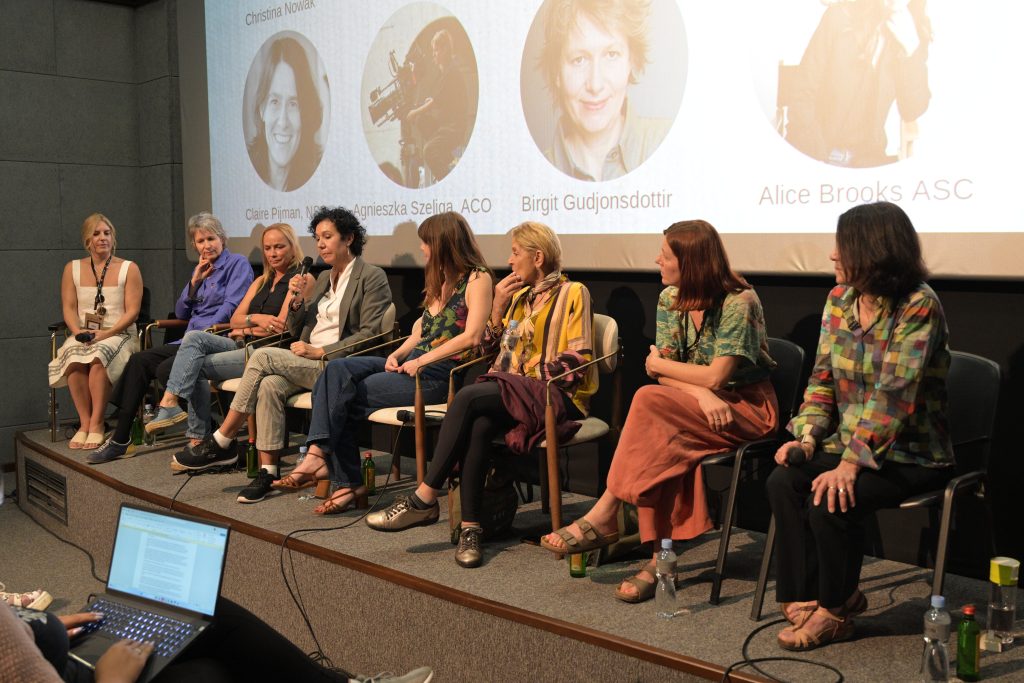The Powerful Women of „Manaki“: I was raised by a single mother who taught me not to give up on my dreams

“Whenever we talk about female cinematographers or directors, we can’t avoid the question of motherhood, as well as how we as women manage to take care of the home, the family. But where are the men in this story, they are also responsible for all this”. This was noted at today`s event „The Powerful Women of ‘Manaki’“ held in the Bitola cinema, where women cinematographers from different countries spoke. Inspiring life stories were shared by Alice Brooks, Nancy Schreiber, Agnieska Szeliga, Clarie Pijman, Brigit Gudjonsdottir, Christina Noak, Teresa Medina and Oona Menges.
„My family was very poor. When I was young, I had two dreams, one – to become a cinematographer and it came true for me, I grew up on a set. My other dream was to have a child, I wanted to be a mother. I have a daughter who is the joy of my life and who now comes with me everywhere. So work to make your dreams come true“, said Alice Brooks.
Nancy Schreiber said she was a graduate psychologist, but that she didn`t want to do this job.
“I started working as an electrician on a set, working with the director, and I didn`t know anything about it. It`s not easy for women in this world. But I am grateful that I started as an electrician, and later I went to film school, and here I am after many decades, and today I am very happy when I am making a film“, Schreiber said.
Agnieska Szeliga and Teresa Medina stressed that they had to be creative in the face of difficulties in their professional lives, which were filled with men. They sent a message to young people to always believe in themselves and not to stop dreaming.
Clarie Pijman said that she chose to go to film school even though her parents were doctors.
„I first started assisting on sets. I wondered how I could start recording when this is a male profession. I made my first film with borrowed money. I don't regret anything and I still want to work cinematography“, she said.
For Christina Novak`s parents, film school was a joke, given the fact that their profession was completely different.
„We all have different stories, but we have the same energy with which we respect each other. We are like a family“, Novak said.
Cinematographer Brigit Gudjonsdottir shared that she was raised by a single mother.
„My mother worked from dawn to dusk. She was an example for me and a person whose values I followed through life. Later I became a mother as well, so I took my daughter to sets. I started working as an assistant in this industry. When I saw that Nancy Schreiber was a cinematographer, a and then Alice, I thought, when these women can do this and make wonderful films, so can I“, Brigit said.
Onna Menges wanted to work initially as a veterinarian, but later had the opportunity to work on a film, where her professional story began.
“You know, when you have to survive and take care of your child, you`re going to work bloody hard to succeed. Whenever I have difficult moments in my life or on a set, I am reminded that this is what makes me grow and mature and that is why I am grateful for it“, Menges said.
Some of the cinematographers also talked about mental health, and several of them do additional back up work, in case they do not work on film projects. Thus, Brigit said that she is a freelance teacher who teaches when she is not working on a film.
„The most stressful time for me is when I am not working between films. You know, we have to eat and pay bills every day. I go to a mental health support group, I do yoga and find other ways to cope with stress”, Medina said.

